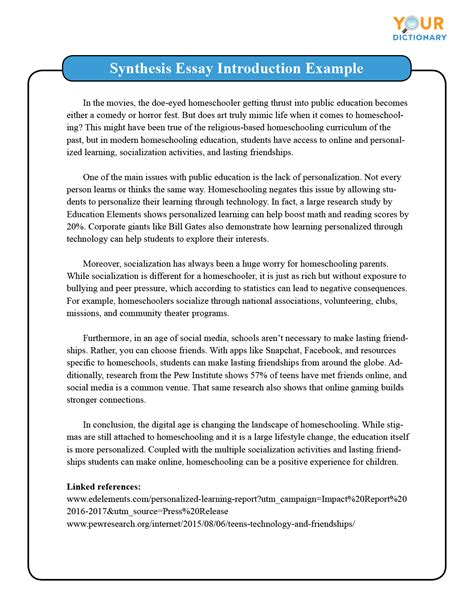Conducting a comprehensive synthesis paper involves integrating information from multiple sources to provide a cohesive and original work. This article offers a comprehensive guide to help you navigate the process effectively.

Step 1: Gather and Review Source Material
Begin by gathering relevant academic papers, articles, books, and other credible sources that align with your research topic. Thoroughly review these materials to grasp the scope of existing knowledge and identify potential areas for further exploration.
Step 2: Analyze and Synthesize Information
Critically analyze the gathered materials to identify key findings, theories, and perspectives. Extract the essential information and organize it into categories or themes. Synthesize this information by identifying connections, patterns, and discrepancies among different sources.
Step 3: Develop an Original Argument
Based on your synthesized findings, formulate an original argument or thesis statement that presents a unique perspective or interpretation on the topic. Ensure that your argument is supported by credible evidence from the source material.
Step 4: Write a Cohesive and Well-Structured Paper
Structure your paper using an introduction, body paragraphs, and a conclusion. The introduction should provide context, state your thesis statement, and outline the organization of the paper. The body paragraphs should present your synthesized information, supporting evidence, and analysis. The conclusion should summarize your key findings, restate your thesis statement, and discuss the implications and future directions for research.
Step 5: Cite and Reference Sources
Properly cite and reference all sources used in your paper. This includes in-text citations and a comprehensive bibliography. Failure to do so may constitute plagiarism.
- Use a citation management tool: Software such as Zotero or Mendeley can help you organize and reference sources efficiently.
- Create an outline: A detailed outline can guide your writing process and ensure a logical flow of information.
- Seek feedback: Ask peers, colleagues, or a mentor to review your paper and provide constructive criticism.
- Proofread carefully: Thoroughly proofread your paper for errors in grammar, spelling, and punctuation.
Synthesis papers have numerous applications in academic research and beyond:
- Advance Knowledge: They contribute to the collective understanding of a particular topic by synthesizing existing knowledge and presenting new insights.
- Identify Research Gaps: By consolidating information from various sources, synthesis papers can reveal gaps in the current body of knowledge and suggest areas for further investigation.
- Inform Decision-Making: Policymakers, business leaders, and other decision-makers can use synthesis papers to make informed decisions based on comprehensive and up-to-date information.
- Education and Training: Synthesis papers can be used as educational materials for students and professionals to expand their knowledge and understanding of a given subject.
| Table 1: Common Challenges in Writing Synthesis Papers | Table 2: Tips for Synthesizing Information Effectively |
|---|---|
| Locating and gathering relevant sources | Identify key concepts and themes |
| Interpreting diverse perspectives | Connect information from different sources |
| Managing a large volume of information | Create a logical structure for your paper |
| Avoiding plagiarism | Use proper citation and referencing techniques |
| Presenting a clear and concise argument | Focus on the most essential information |
| Table 3: Applications of Synthesis Papers in Various Fields | Table 4: Resources for Writing Synthesis Papers |
|---|---|
| Education (curriculum development, instructional materials) | Academic journals and databases |
| Business (market research, product development) | Online citation management tools |
| Healthcare (evidence-based practice, research synthesis) | University writing centers and libraries |
| Public policy (policy analysis, decision support systems) | Professional writing workshops and conferences |
A well-written synthesis paper synthesizes existing knowledge and presents original insights on a chosen topic. By following this comprehensive guide, you can effectively navigate the writing process and produce a high-quality paper that advances knowledge, informs decision-making, and has a positive impact on your field of study.
Keywords: Synthesis paper, research synthesis, literature review, knowledge integration, original argument, research gap analysis, decision-making support, academic writing, plagiarism prevention
